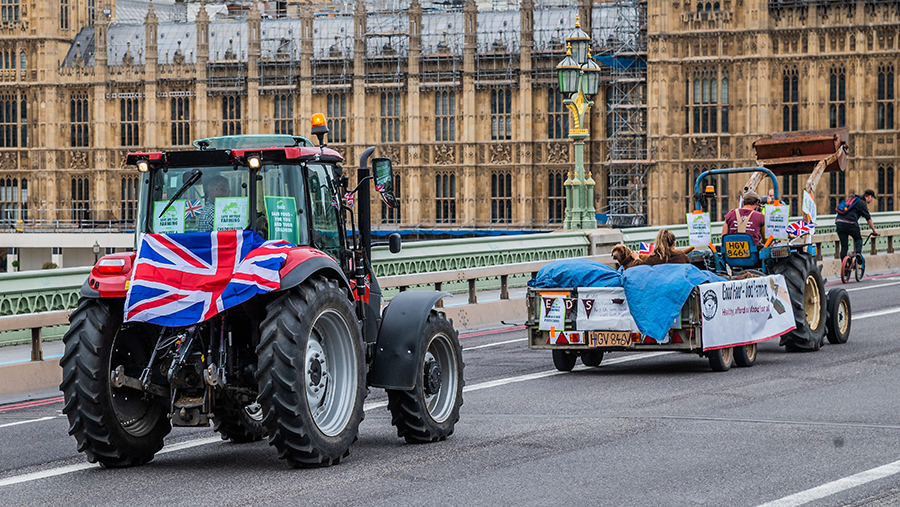2020 a year to forget: Government farm policy
 © Shutterstock/Guy Bell
© Shutterstock/Guy Bell
Most people, including farmers, will be happy to see the end of 2020 and look forward to a better 2021.
The pandemic was a very unwelcome and unexpected event, but what else got our goats? As usual, the government obliged with some unpopular farm policy.
See also: ‘Landmark moment’ as Agriculture Bill passed into law
Agriculture Act – food standards threatened
While there is much in the Agriculture Act that could benefit English farmers, the major element that drew the most criticism during 2020 was its failure to properly protect farmers from substandard imports.
Tory MP Neil Parish tabled an amendment in May seeking to outlaw imports of food under any future free-trade deals if it was produced using methods which would be illegal in the UK.
This was at odds with the government’s view, which said existing bans on things like chlorinated chicken and hormone-injected beef under EU law were sufficient, as these rules would be rolled over after Brexit. In the wake of a government three-line whip, just 21 Tory MPs voted with Mr Parish and his amendment fell.
The bill then moved to the House of Lords, where similar attempts were made to introduce proper protection from substandard imports. Suitable amendments were passed, only to be rejected by the Commons again in a game of political “ping pong”.
One further development in all this was the creation of a Trade and Agriculture Commission (TAC), which was initially given an advisory role to assess future trade deals in terms of their impact on UK food standards.
In the wake of concerted pressure from the House of Lords – and Lord Curry of Kirkharle, in particular – Defra secretary George Eustice eventually agreed to beef up the TAC’s role, ensuring its reports and impact assessments are given full scrutiny by MPs before any trade deal can be signed off.
In reality, this gives neither the TAC nor MPs any specific powers to reject a future free-trade deal if it threatens to undermine UK standards. But it was supported by both the Commons and the Lords and enabled the bill to finally become an Act of Parliament.
BPS cuts to come
Following on from the Agriculture Act, Defra published more details in November of the transition plan, to move farming from the old system of CAP payments to a new system of “public money for public goods”.
To the dismay of many English farmers, this will involve deep cuts to their Basic Payment Scheme cheques, such that by 2024, direct payments for most will be slashed by at least 50%, rising to over 60% for larger claimants.
Some of this money will go into a new Sustainable Farming Incentive scheme – a “broad and shallow” agri-environment venture – and some into a new Farming Investment Fund to help raise productivity. Pilots will start next year to develop a new three-tier Environmental Land Management scheme.
How this will work in practice, and how farmers will be able to plug the funding gap, is still shrouded in mystery. Meanwhile, farmers in the devolved regions look set to retain their direct payments a good deal longer, prompting fears of market distortions within the UK.
Urea ban
The recent government announcement of plans to ban solid urea came as a blow most could do without.
While such a ban is just one of three options being considered to curb air pollution, the consultation that launched in November makes it very clear it is its preferred option.
The two alternatives – to require a urease inhibitor be used in solid urea, and to limit spreading to 15 January to 31 March – both offer better value for money in terms of their cost-benefit ratios. But an outright ban will deliver the most towards the government’s ammonia reduction target, and is the one it seems determined to opt for.
Urea is blamed for releasing ammonia which combines with other pollutants to form lung-blocking particulate matter. But farmers believe emissions can be controlled with better management, while taking urea away will leave them more reliant on ammonium nitrate, which is more expensive and, some would say, more polluting.
